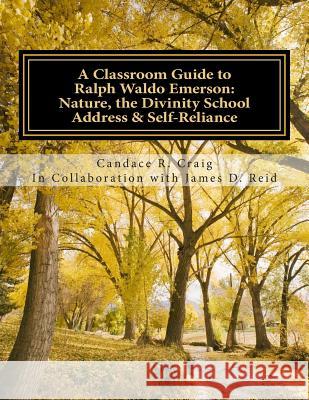A Classroom Guide to Ralph Waldo Emerson: Nature, The Divinity School Address & Self-Reliance » książka
A Classroom Guide to Ralph Waldo Emerson: Nature, The Divinity School Address & Self-Reliance
ISBN-13: 9781507606421 / Angielski / Miękka / 2015 / 108 str.
This classroom guide to Ralph Waldo Emerson is the third in a growing series of Craig's Notes Classroom Guides for teachers of literature. The Emerson guide is a bit different from the others, however. To begin, it is the first of three unique guides devoted to the American Transcendentalists. The Emerson guide is an outgrowth of a collaboration between Candace R. Craig and James D. Reid, Associate Professor of Philosophy at the Metropolitan State University of Denver. Reid's scholarly work includes publications on Kant in world-class journals, such as The Kantian Review and The Review of Metaphysics. He is also co-editor and essay contributor for Thoreau's Importance for Philosophy (Fordham). His second book, Being Here Is Glorious: On Rilke, Poetry, and Philosophy, which includes a philosophical interpretation and fresh translation of the Duino Elegies, is forthcoming with Northwestern University Press (July 2015). Reid has written substantial introductions to each of the three works presented in this guide: Nature, the "Divinity School Address," & "Self-Reliance." He has also contributed some of his own ideas for advanced-level essay prompts and college-level class discussion questions. The Emerson guide is thus a cohesive amalgamation of the expertise of a serious scholar and a veteran teacher of high-school English. The first section of the guide contains pre-reading activities and two substantial introductions. The subsequent three sections take a chronological approach, beginning with Nature, followed by the "Divinity School Address" and culminating in "Self-Reliance." Each of these sections contains a helpful introduction (Reid), followed by a combination of classroom activities, tests, quizzes, writing activities, etc., focusing on everything from vocabulary to basic comprehension to rhetorical and literary devices to essay assignments, and more. The final section of the guide contains culminating activities that challenge students to practice their writing and critical thinking skills by synthesizing and drawing connections between each of the three Emerson texts and the spiritual or intellectual descendants of Emerson's legacy (i.e., Thoreau, Whitman, Frost, Stevens, Dillard, and recent sojourners seeking to experience deeper meaning and self-knowledge through their correspondence with nature). The final pages include lists of project ideas, research topics, and advanced essay prompts.
Zawartość książki może nie spełniać oczekiwań – reklamacje nie obejmują treści, która mogła nie być redakcyjnie ani merytorycznie opracowana.











